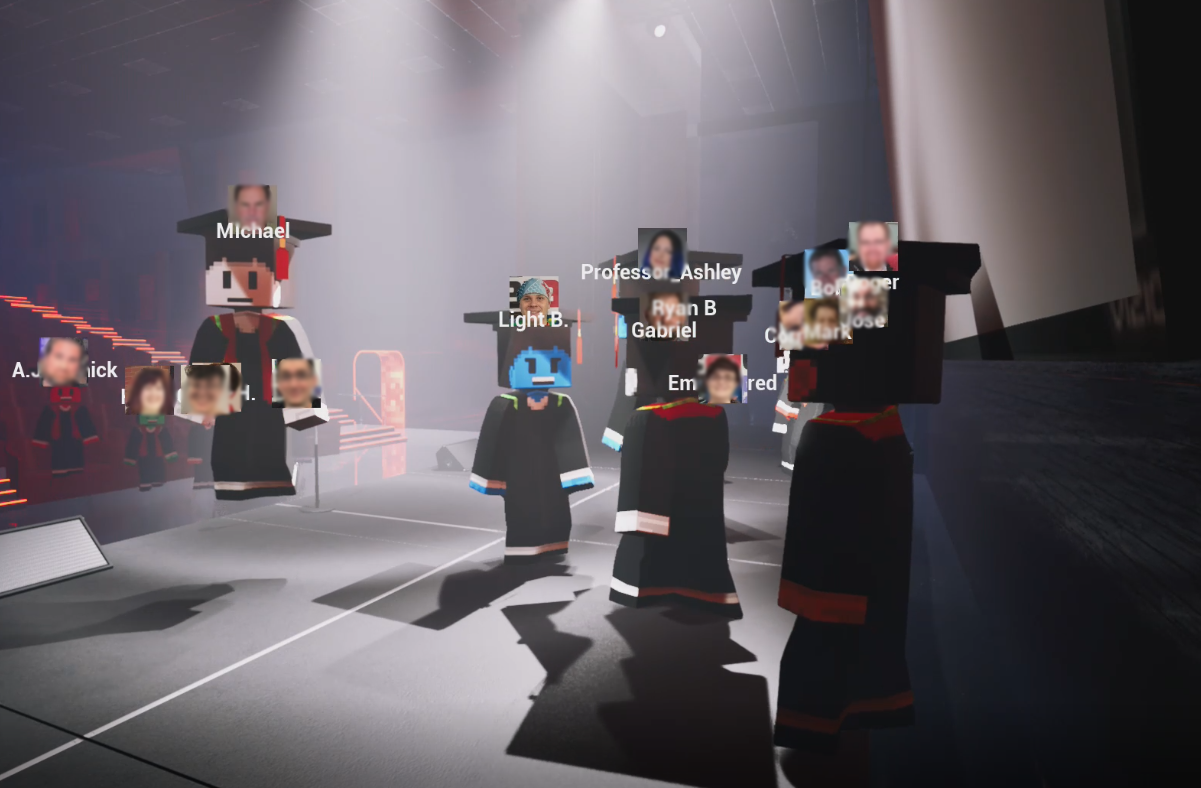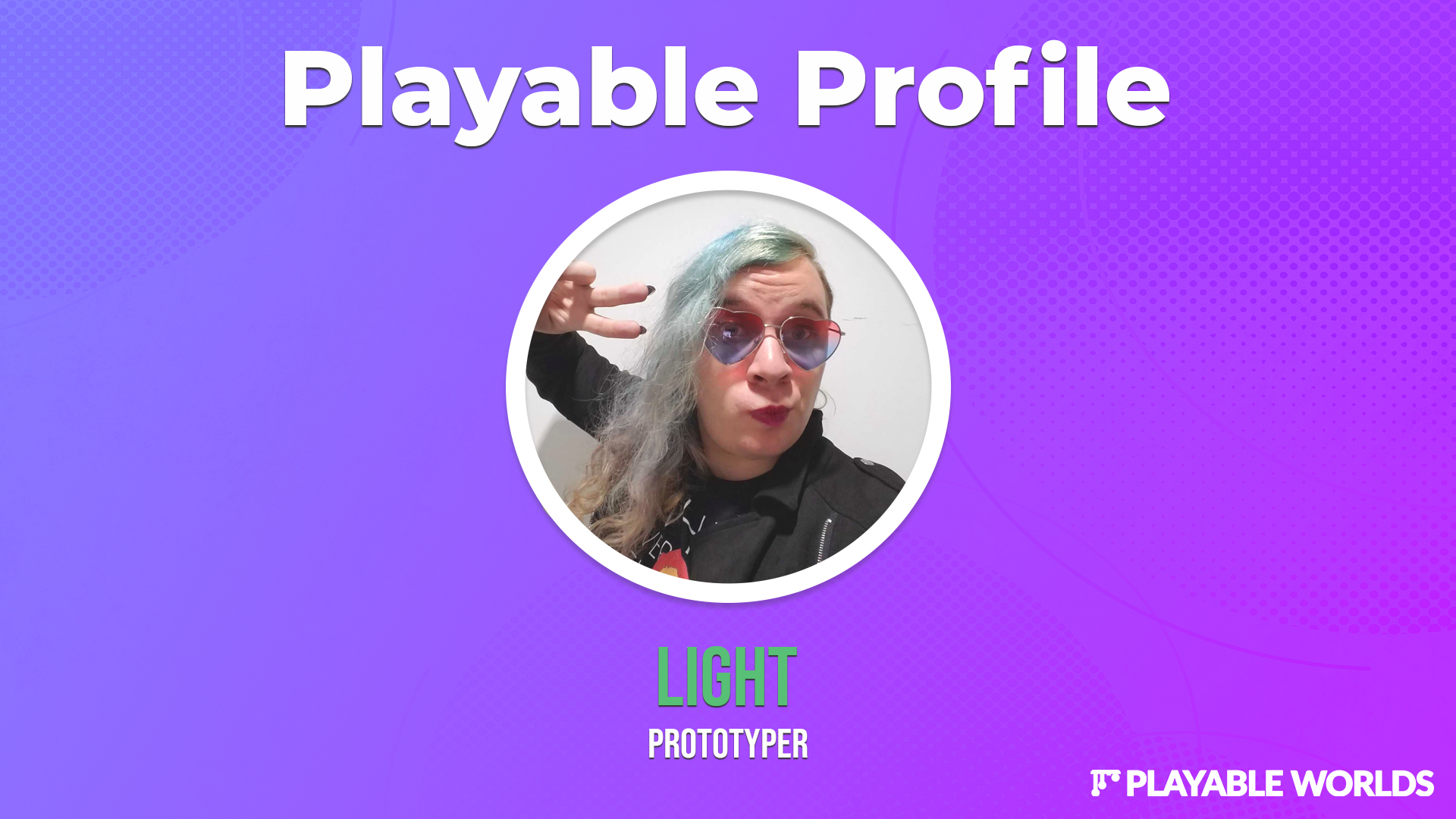In the latest Playable Profile, I had the pleasure of chatting with Light, who is on our design team! We talked about their experiences with games, what it’s been like working in the industry for the first time, and more! It was an absolute deLIGHT! (I just had to add a bad pun 😅) Read on to meet them!
VioletLight: Let’s get started! Can you introduce yourself and tell us a little bit about your role at Playable Worlds?
Light: I’m Light, resident bigender prototyper here at Playable Worlds. In my case, bigender means I use any pronouns, so they/she/he are all fine!
As far as my role as a prototyper, I’m part of the design team and my job is to put together playable versions of all of our mechanics before they go into the game. My team breaks down every piece of our game to playtest and iterate on all the systems. Basically, our job is to really flesh them out and make sure that they are fun and enjoyable, before we actually hand them to engineers and artists, who implement them for real. If we find that something is going to be too grindy or clunky, or was great on paper but not in implementation, prototyping lets us either fix it or scrap it, without wasting tons of time.
V: Since we’re both Lights, I wanted to ask a fun question before we go deeper into the interview. What color would your Light alter-ego be?
L: I do really like purple, but I think you’ve beaten me to it! If you want an adjective to differentiate us you can usually find me online as LightDiscordant, though I do love LavenderLight’s alliterative lilt…
V: LavenderLight has a nice ring to it!
What got you interested in Game Design and what was your career path? This is your first real game design job, right?
L: Yeah! When I started college, I was so sure that I was going to be an astrophysicist. I always loved learning about math and science and all that. In college, I realized I loved learning about those things, but I found the subject matter more interesting than the day-to-day, y’know? So I had a moment of panic where I was like, “Oh my gosh, what am I going to do with my life?” For so long I was certain of my path, and then suddenly I had no idea.
So, I took a step back and looked at all of my hobbies and realized that everything I did for fun – playing and composing music, homebrewing mechanics and systems for tabletop RPGs, writing stories and worldbuilding – all had a place in games.
I’d chosen my university for its math department, but fortunately, it also had an awesome department for Entertainment Arts & Engineering, which was their fancy way of saying Game Development. I started taking classes, dabbling in everything. I wanted to know it all, from the entire art pipeline, how to code, all the way to design principles.
I wasn’t sure where I’d land for a long time because I loved it all. But I quickly found that my breadth of knowledge gave me an edge as a designer because I had a pretty good understanding of the scope and tech constraints that would go into every idea. And here I am, several student games, published side projects, and a graduate degree later. It was a pretty winding road, but the adventure has been well worth it.
V: That’s so great that you were able to use all of those things that you’ve learned and now you have your ideal job!
L: It’s amazing, I love it!
V: When you started here at Playable Worlds, did you have any preconceived ideas of what your day-to-day might look like, and were they different from what you’ve experienced?
L: I had a fairly good picture of the industry before I got into it. I read up on a lot of gaming trends and talked with friends who were already in the industry, too.
There are details about some of the day-to-day things that weren’t quite what I expected – like I didn’t realize just how many meetings there are every day for everybody. Overall though, the work I’m doing is everything I hoped the job would be.
V: Do you have a favorite project that you’ve worked on?
L: I can’t talk much about the neat stuff I’m doing currently, of course, but one of my favorite projects outside of Playable Worlds is actually a perfect example of how cool games are as a medium. The pandemic started during the last semester of my masters program. An artist in my program and I whipped together – on top of our final theses – a prototyped MMO so that my cohort could do a virtual graduation together instead of just a video call.
The artist, Doug, built a wonderful environment; a scaled one-to-one reproduction of our lab with this elaborate stage added in. I put together all the networking, player controls, etc. We had very little time, and plenty of stress with a global pandemic on top of everything else, but somehow we managed to duct tape and bubblegum together what was basically an 80-person one-time-use MMO.
It was so rewarding! We did it sort of in secret, mostly because we didn’t want to promise it to everyone and then have it not work out. There was enough bad news and disappointment going around at the time. But, when we got it working and people were able to start connecting, it was just like Christmas for me, seeing everyone login with their faces floating as little .pngs over their little boxy characters in graduation robes.

V: That’s so awesome! What are some of your favorite games?
L: Oh gosh, my game tastes are all over the board, from smaller narrative experiences like Transistor to massive live titles like Destiny 2.
I gravitate a lot towards games that do really interesting things with mechanics-as-metaphor or choice-consequence systems. I love The Stanley Parable because it manages to be a hilarious, replayable experience by just narrating over you choosing where to walk. The World Ends With You on DS built the dual-screen into both its mechanics and its narrative, which I always thought was really cool and I’m sad there’s no real way to capture that the same way on the Switch port. And Brothers: A Tale of Two Sons is… I won’t spoil it, but if you haven’t played it, the ending is one of the best examples of mechanics-as-metaphor that I’ve ever seen. It’s amazing and makes me cry.
V: I love when games have that kind of impact on you, where you just feel emotionally tied to the story and the people, even though they’re not real. When game developers can create something that we can connect to, it’s so special.
L: Yeah, that’s one of the reasons that I really love games: the way they can resonate with people. As I’m thinking about my favorite games, I’ve put them into two categories. The first are the ones that emotionally impact me or make me think about things in a new and different way. And the second is the multiplayer games that I use to keep in touch with friends. It allows us to get together in a virtual world and still spend time together and build those emotional and thoughtful connections.
V: When you were talking about how games connect people, it reminded me of the beginning of the pandemic, when we were all stuck in our houses and quarantined. I played games more than usual because I wanted a way to hang out with my friends. I played so much Animal Crossing: New Horizons. We would all hang out in-game and via voice chat.
What other things do you like to do when you’re not gaming or making prototypes?
L: I love music, I play several instruments. I love books; I feel naked if I don’t have a full bookshelf in every room. I write, too!
V: I think you and I have actually talked about NaNoWriMo (National November Writing Month) before. I try EVERY year and every year, I fail.
L: Same! I succeeded once in 2011 and I haven’t hit the 50k word count again since. I firmly believe that the point of hobbies is not to be good at them, but to have fun with them. I’m a rubbish writer, but I have a blast and that’s what matters.
V: Exactly!
I just have one more question for you – What advice would you give to someone wanting to get into the gaming industry?
L: The last time someone asked me that question, I went to type up a short answer, and ended up writing a 27-slide presentation. So I will try to keep this shorter than that. [laughs]
There’s a lot of great advice out there, and most of it has been said better than I could say it, so I think I’ll try to give advice I don’t hear often. This is applicable to everyone, but especially for people wanting to get into design: learn everything and do everything. And I don’t just mean that if you want to be a designer you should learn how to code, learn the art pipeline, etc. I mean, do that too if you can, sure, but I’m talking bigger than that.
One of the coolest things about being a designer is that everything is important. If you want to be a really good designer, it’s not just learning everything you can about games. Learn about philosophy and religion and science and poetry and architecture. You don’t have to be an expert on everything, but anything can be brought into game design. Broadening your horizons beyond strictly “game dev” will do wonders for you.
And more than anything, you need to find your own voice. Figure out what knowledge, perspectives, and experiences make your ideas different and special. Sometimes that’s easy and sometimes that’s really, really hard – especially for us introverts. So get out and live a little! Go on an adventure, talk to a stranger, make an interesting mistake. The stories and experiences, no matter how small, will go a long way towards making you an awesome designer.
V: I love that advice! Thank you so much for chatting with me, Light!
I hope you’ve enjoyed this discussion with Light and learned more about game design and prototyping!
Next month, I’ll be interviewing one of our artists, be sure to check back soon!
Want to keep up with the latest? Follow us on social media!


